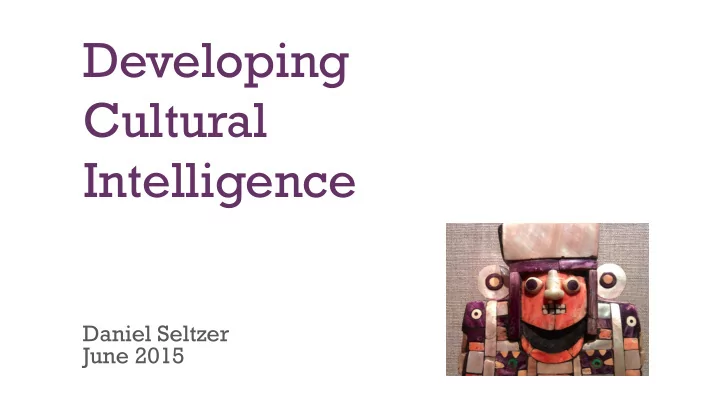

Developing Cultural Intelligence Daniel Seltzer June 2015
+ Me: 33 years of creating software products at dozens of companies
What you care about as a Technologist Making things
+ You care about n Making good systems n Making it scale n Making good choices about leaders and teams n Making money n Making Hacker News n Making it out alive
+ We’re not logical, Mr. Spock n Behavioral decision making research: deep cognitive biases n Good software is still a lot of art n No one picks only great, successful teams n It’s about people, trying to work together n Or kill each other n Read Kahneman and Tversky
It’s all about People So how do you develop that?
+ Why Culture matters n Culture is what shapes how people work together n Culture is what makes companies great n Culture is to blame when people aren’t doing the right things anymore n Culture is a powerful tool that offers new solutions n Read “It’s Your Ship” by Abrashoff
What is Culture in our context? Shared expectations for behavior
+ Cultural Intelligence n Can’t RTFM; it’s rarely written out n So learn to recognize , reason about, and affect culture around you n In time, gain the confidence to create your own culture
Culture is event-driven It’s all in how you handle it
+ Culture happens in real-time n At the boundaries between people, between groups n Unexpected challenges n Discovering what the rules are n Rituals that reinforce n Human interest: fear, anger, surprise, punishment, reward n Stories are repeated
+ Leaders set culture n As social animals, we look to our leaders first n Leadership controls the crude rewards -- hiring and firing n But if you set the culture, people look to you as a leader, even if you don’t have that control
Learn to Recognize the Components of Culture Elements of a language
+ API Attributes and Values Attribute Default Value Upper Bound Control Centralized Distributed Information Private Shared Emotion Ego Empathy Responsibility Avoidance Ownership Dissent Unacceptable Encouraged Motivation Extrinsic Intrinsic
+ There are many more… n Planning : wish-based vs. reality-based n Humor : serious vs. playful n Recognition : taking credit vs. giving credit n Org structure : static vs. dynamic n Collaboration : fraught vs. effective n Risks : avoid vs. engage actively n Truth to power : dangerous vs. supported
So?
+ Make culture choices n Figure out what culture matters to you -- what is your personal culture? n When you interview for a job, ask questions about cultural elements n Choose positive culture over other rewards n Read Drucker’s “Managing Oneself”
+ Learn to influence culture n Develop the confidence to speak when group culture conflicts with personal n Have the courage to try and improve where you are n Have the courage to leave when it’s unhealthy
+ Learn to create culture n Choose people for their cultural fit n Teach by modeling the values you want to establish n Be clear – ambiguity sets a cultural value n Doing the right thing when it’s hard is what makes you a leader, and makes people willing to follow you
+ Reach me dseltzer@h2co3.com @danielseltzer https://www.linkedin.com/in/danielseltzer
Recommend
More recommend